Geminder and Karin recollect memories, spread awareness

The Holocaust took place in World War II as Adolf Hitler ravaged Europe. Just hours after sleepy heads were sent to bed, they were awoken by the sharp sounds of crashing glass. The air, once thick with silence, was quickly corrupted by the crisp noise of shattered windows and crackling fire. In the dark hours of Nov. 9, 1938, Kristallnacht invaded the night, and changed the lives of millions.
Although there is a 77 year gap between Kristallnacht and modern day, it should not cease to be remembered. In fact, while some may never think twice about the date, there are many who cannot escape the memories that Nov. 9 hails.
In honor of those who survived the day, Congregation Beit Shalom, located in Visalia, hosted ‘Remembering Night of Broken Glass’, Nov. 6. To commemorate all those who were victims of the Holocaust, survivors Robert Geminder and Gabriella Karin shared their stories.
To commence the night, Geminder took the stage. The driving force behind his words was the importance of sharing his memories and passing them down to younger generations, so that the Holocaust might never be forgotten.
“We’re survivors, in the broad sense,” Geminder said. “There are many survivors that don’t talk about the Holocaust, and I respect them, that’s fine. Gabriella and I, and many others, have chosen to. We want to make sure that you’ll send my website address and story to your kids and grandkids. I want them to know.”
Geminder has been heavily involved in various endeavors, such as UCLA’s Center for Jewish Studies course on “Between Memory and History: Interviewing Holocaust Survivors in the Digital Age.” Geminder wastes no time spreading the word, and he explains that this is because he feels called to action as a “primary source.”
I was hidden, in the center of the city of Bratislava. Across the street from the Slovak Gestapo. I could see inside the doorway, they couldn’t see me. I was on the third floor, where there were eight people hidden by a 25-year-old lawyer, who had it in his heart to risk his own life and hide us for nine months. I was 13 at this time, for nine months, a whole school year, I was sitting on a chair, I could not move around. — Gabriella Karin, speaker
“All of you here are what I call secondary sources,” Geminder said. “I’m a primary source, as is she [Karin]. It’s very important to have you as secondary sources to talk to people when discussion comes up, and to tell your kids. The biggest problem us survivors have, when we think back on it, is ‘Oh my God, when we’re all gone, what’s going to be?’. Well, what’s going to be is Holocaust museums and places like this, where, when I’m gone, you can go on the internet and pull up my story.”
After Geminder closed, the room was heavy with the haunting statistics of lives lost throughout the Holocaust. Yet, the crowd was curious, asking various questions and yearning for more information.
To quench the thirst for more knowledge, the second speaker, Gabriella Karin, took center stage. Karin drew in the crowd with a personal appeal, telling anecdotes and revealing the gritty details of her years in hiding in Slovakia.
When the Holocaust began, Karin’s family was not immediately under siege. Because of this, Karin’s mother assisted fellow Jewish citizens in any way possible.
“My parents owned a small deli store, which was located next to the police station. Because of the location, they knew everybody’s name,” Karin said. “When the deportation started, my mother joined the Underground. The Underground was a secret organization that helped people in trouble — at this time, the Jewish people were in big trouble. My mother got, from one of the policemen, the list of people who would be picked up on a certain night, and was able to give it to the underground.”
For nine months, Karin remained hidden in the home of a young lawyer. During that time, she could not leave or move around, because it would risk her life.
“I was hidden, in the center of the city of Bratislava,” Karin said. “Across the street from the Slovak Gestapo. I could see inside the doorway, they couldn’t see me. I was on the third floor, where there were eight people hidden by a 25-year-old lawyer, who had it in his heart to risk his own life and hide us for nine months. I was 13 at this time, for nine months, a whole school year, I was sitting on a chair, I could not move around.”

Karin stresses the importance of strengthening ones mind. There are many things that were taken from Karin, but her intellect and knowledge could never be stolen.
“The only thing that I could do was read,” Karin said. “The lawyer brought me books. But he could not bring me books for a young girl, because everyone was watched. He brought me heavy study books to read, and I was reading whatever I got into my hands. And guess what, after liberation, I jumped a grade. Everything can be taken away from you, even the clothes you wear, but nobody can take away from you what you put in your head.”
The night was filled with emotion, but effective in achieving its purpose. Geminder and Karin will continue to tell their stories, so that the world might never forget the pain suffered by the victims of the Holocaust.
For more information, visit Geminder’s website or read Survivor: Gabriella Karin.
This writer can be reached via Twitter: @_chloemueller and via email: Chloe Mueller.


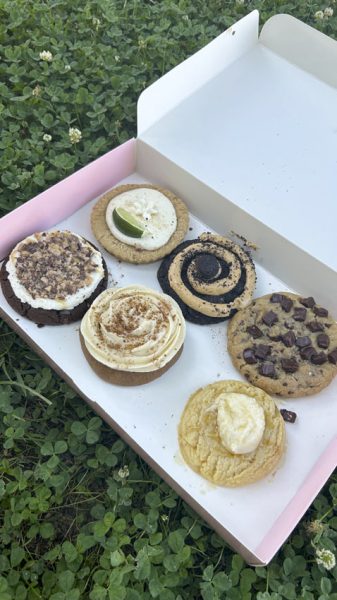
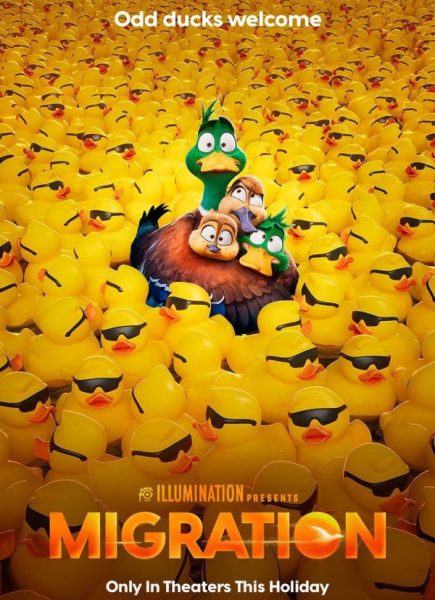



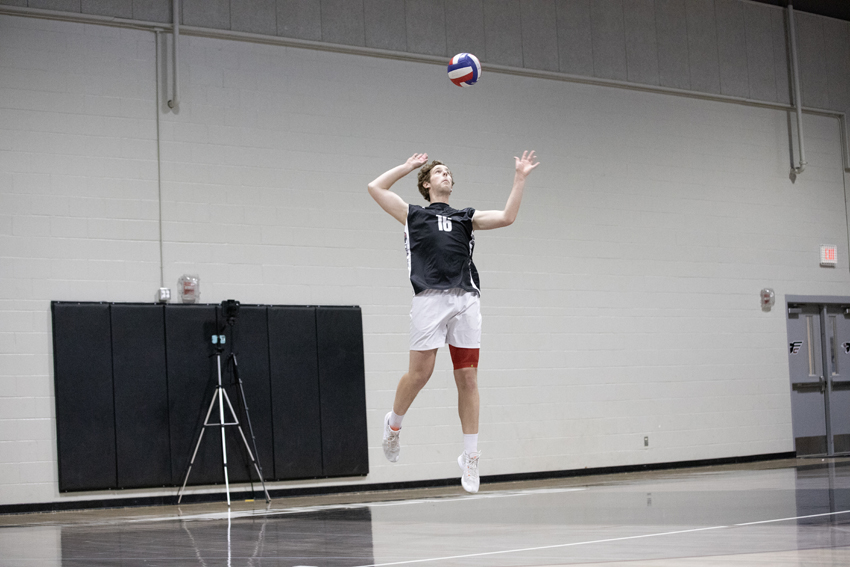
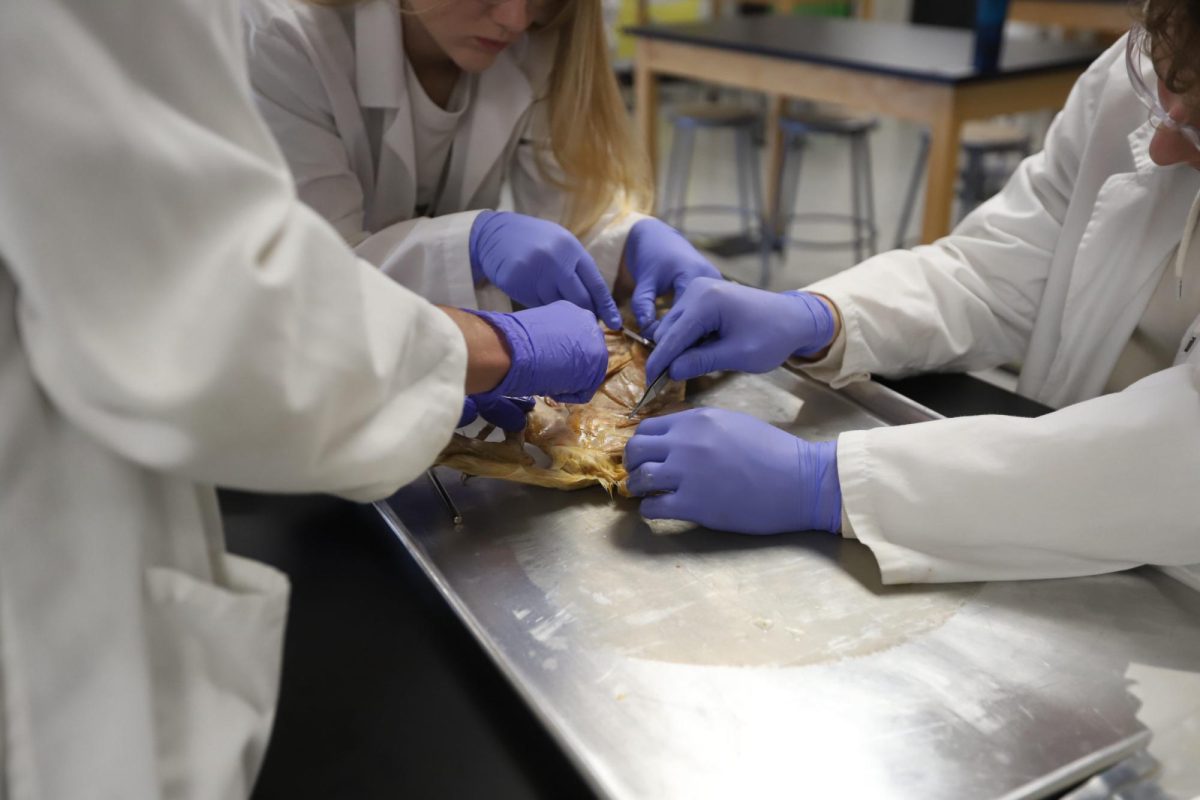
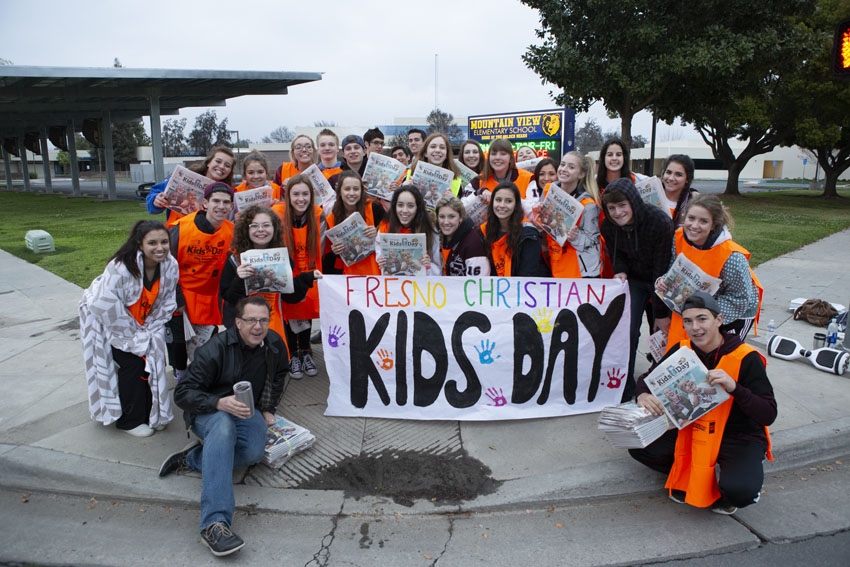
![[Video] 100th CSPA Spring Journalism Conference](https://thefeather.com/wp-content/uploads/2024/04/20240308-cspa-crown-002.jpg)
![[Video] New York Day 4](https://thefeather.com/wp-content/uploads/2024/04/NY-trip-day-4-JC-.jpg)
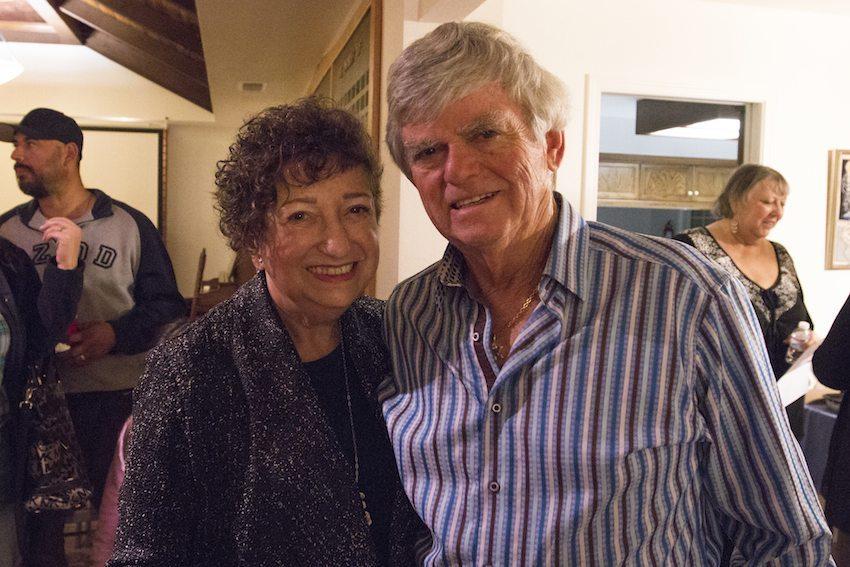


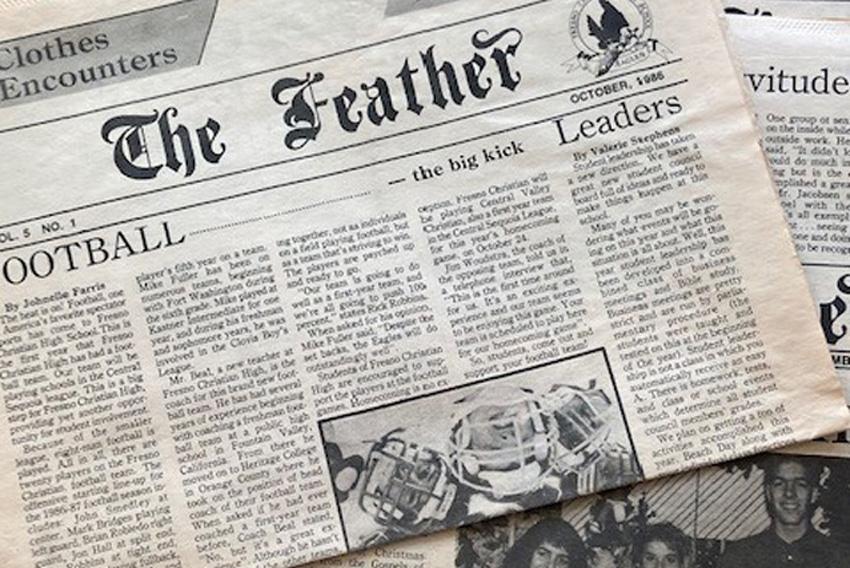


Roman Endicott • Dec 1, 2015 at 4:04 pm
I thought there was a lot of value in Karin’s comment of the importance of strengthening ones mind. I noticed that Karin gave a lot of information about her emotions rather than just stated the events that happened, which was really nice. I can’t help but compare this to what it would be like if I were in her shoes because she was around the same age as us. I cannot imagine what I would do if were in that situation. It makes me happy that they are willing to share their experiences with the world because it is very important to be informed about this topic.
Melissa Tostado • Dec 1, 2015 at 1:43 pm
It’s really brave of Germinder and Karin to share their traumatic experiences so people can still remember what happened. It also benefits those who don’t know exactly what happened; for them to hear experience first hand. It’s a great thing they continue to tell their story to drawl people’s attention towards history.
andy Lyu • Dec 1, 2015 at 1:28 pm
The Holocaust took place in world war tow. The Holocaust was very terrible. this Holocaust has killed a lot of people, that include children man woman and old people. victims spend long time in Holocaust, they need work a lot and eat little. everyone think they will died they live with scared and night. the victim looks like lose their spirit.
long time ago, their have a few people running out of Holocaust, they just can’t believe they have running out of Holocaust, even the survivals has running out of the Holocaust but they all died soon. because they got a lot of hart. the survivals also want share their experiment to other. because that was os terrible.
Hanna Hong • Dec 1, 2015 at 12:40 pm
Reading and hearing about the article and the video really helped me come to understand their perspective towards their experience. I could really feel their sorrow from their loss from the Holocaust experience. Robert and Karin was really brave to talk about their past and I hope that they and the other survivors could have a great rest of their lives.
trisha CUI • Dec 1, 2015 at 12:39 pm
I’m so thankful that they are willing to share the stories about the holocaust that most of other survivors won’t.The memories about camps are painful to them,but they are still willing to share with people to help,to keep their stories be able to pass on to future.The thing really make me suprising is they survive from such a horrible condition and had lots of bad memories can still be optimistic,as the book we read in English,this article is also really powerful.I am so glad I’ve learned a lot from these stories,I hope i can heard more stories about them.
Wyatt koop • Dec 1, 2015 at 12:35 pm
When Gabriella Karin says “we need to strengthen our minds”, I completely support this quote because when hardships come we need to be ready and strong to go up against them.
Erich Miller • Dec 1, 2015 at 12:33 pm
This is one of the most interesting articles I have read in a very long time. I have learned so much during our Holocaust unit in English and fascinating first hand stories from this interview with Geminder and Karin about their experiences in the Holocaust during World War 2. I am looking forward to meeting one of the Holocaust in person and hearing about his experience.
Joshua Villa • Dec 1, 2015 at 12:29 pm
This was very interesting to watch and read. I wish I knew about this was happening so i could have gone and listened. It would have been cool if they asked them during the interview, how they adjusted to everyday life after the holocaust.
Cate Vander Kooi • Dec 1, 2015 at 12:21 pm
Both Robert Geminder and Gabriella Karin have such inspirational stories, I have so much respect for them for sharing their experiences with us. Their message was so true, it’s important that we don’t forget the Holocaust. It was such a tragic and important part of our history, and through stories like these we can remember those who lost their lives in it. Reading about how both of these people lived through such a horrible time truly reveals the extent of the cruelty the Jews were exposed to, and provides further insight on the subject.
Joey Huang • Dec 1, 2015 at 11:55 am
I wasn’t there during the speech, but I can still feel the powerful strength passed by the speakers. I think they are the lucky ones, God had a different plan for them, survive and pass the story to us. Also, they are strong. They take their experiences well and are willing to share them. Their stories are not dramatic, but still, show the power of human life.
I am actually not sad after reading it, instead, I feel responsibility. I am so happy for their survival and really appreciate them for sharing with us. I think the purpose of this is to make us remember the history, they are trying to pass their memory to the next generation. That works, for me. I can feel the effort they are making to make the world better and the responsibility they have to pass the history. We shall never forget.
Natalya Hill • Dec 1, 2015 at 11:51 am
This article was really great at capturing the speakers’ emotions and stories. I really liked the short background information that you included in the first paragraph because it really set the mood/ prepared the reader for the rest of the paper. I also felt that the structuring of the article was really well-thought-out. It allowed the reader to follow the content more efficiently and have a better understanding of the speakers’ words. Thank you so much for covering such an important and historical event.
Erin Wilson • Dec 1, 2015 at 11:50 am
I thought both the speakers had very amazing stories! It was inspiring to learn that even in terrible times there were people willing to open their homes to strangers and keep them safe. I think it is great that they are sharing their stories so that our generation is able to learn first hand what it was like to go through this event. This article shows a lot about how many people were in hiding for months but still managed to stay positive. I am thankful our school was able to listen to them speak and provide us with this information.
Nathan Mount • Dec 1, 2015 at 11:43 am
While gaining a lot of knowledge about the Holocaust in English, reading this article and how you guys got the opportunity to talk to the Holocaust survivors, Robert Geminder and Gabriella Karin was really awesome. It’s really inspiring to me and left a big impact on my life to see these two people survive such a horrible tragedy to the Jewish race, and still be happy to be alive today. I hope that other people while learning about this couple can be as inspired as I was and take into consideration what their life was really like
Devin Pitts • Dec 1, 2015 at 11:41 am
Having the opportunity to talk to a holocaust survivor would be amazing. I would have so many questions to ask them. One question I would ask is what they did to survive such a horrific event. I would also ask what they’re emotions where after the holocaust. Reading this article made me really think about the horrors the Jews went through and what they needed to do to survive.
Matthew Sue • Dec 1, 2015 at 11:40 am
The Holocaust was very dark time in human history and it should be remembered. This article answers the need to remember this horrible tragedy and preserve the stories of those who survived.
Stephen Walters • Dec 1, 2015 at 11:34 am
They’re statements are less dramatic than usual survivors talk about but none the less powerful, the stories were powerful and it is always a pleasure to read or listen to survivors of our worlds lowest points.
Mariana Fikse • Dec 1, 2015 at 11:33 am
Both of them have such amazing stories! I wish I could have been there to hear them speak… I really respect them for telling their stories, I’m sure that’s not an easy thing for them to do. It is important that we learn from both of them (and from other survivors) and listen to their stories, because like they said, we are the last generation who are going to be able to hear and remember their stories. It is so important that our generation takes the time to listen to Holocaust survivors so that we can keep their stories alive and be able to pass them on to future generations. I hope one day I will be able to speak to one of them in person.
Javier Carrillo • Dec 1, 2015 at 11:31 am
What these two people have gone through, and how they have been able to pull through it, while at the same time talking to the public about it is truly astonishing. I can never understand how someone can have so much strength to survive something so horrendous both physically and mentally. The words of wisdom both these share should be something that all of us keep in our minds, and we should make sure to spread the word of what happened to them and their experiences especially when they are gone. I feel really connected to a statement that Gabriella Karin told the audience, “Everything can be taken away from you, even the clothes you wear, but nobody can take away from you what you put in your head.” This means so much to me because of the powerful truth that it holds.
Jaden Ventura • Dec 1, 2015 at 11:30 am
This article was very interesting to read, and a whole new experience to me as to how hard people fought to stay hidden from the Gestapo during World War 2. Robert Geminder and Gabriella Karin’s story had such an impact on me in that I always knew about the horrors of the Holocaust, but I never really got to hear from a primary source on the fact of the matter. This article gave me a lot of insight on the fears and struggles of the Jews. I am truly thankful that this article gave me the realization that I never had.
Matthew Oliver • Dec 1, 2015 at 11:29 am
Geminder brought an interesting point that the survivors that we have today aren’t always going to be here. With the holocaust being such an impact full event, and the only people who truly know what happened are dwindling. If anybody can, they should listen to their story, we never know what they have to tell.
Lauryn Tucker • Dec 1, 2015 at 11:26 am
This is a great article. I like the fact that they are telling their stories to continue to inform young people about the historical event. There are few who share their stories with the world, but those who do help us to never forget the pain that was left after the Holocaust.
maicy luginbill • Dec 1, 2015 at 11:26 am
The holocaust was a time that the Nazis where very cruel to the Jews! I really don’t know how she did it! If i was a Jew during this time i think i wouldn’t be able to do it, or to be able to live without my family! This article is very good and it shows people that everyone is just like each other and is important! there was no reason for the Nazis to hate the Jews but it was in their mindset that they hated them, which brought the Jews hatred in there hearts!